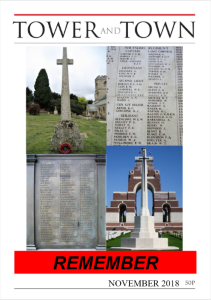

Tower and Town, November 2018 (view the full edition) (view the full edition)WWI: What Was It All About?In 1914 a brutal war put a sudden stop to the largely peaceful 19th century. It had owed its relative stability to the balance-of-power strategies of the 1815 Congress of Vienna and had witnessed remarkable material, intellectual, and moral progress. Why did this happen? Historians don't agree. Some argue that big events do not necessarily have big causes. Human folly is sufficient. Better statesmanship could have averted war. The culprits were bungling monarchs, reckless generals, inept diplomats. Europe "slithered" into war, according to Lloyd George. Everyone was sleepwalking - the whole thing a ghastly aberration. To others the war was the inevitable clash of European nation states that had previously carried out their rivalries scrambling for empire in Africa and the East and for the spoils of the collapsing Ottoman Empire - a powder keg that only needed a spark. To others, again, it was all about Germany: recently united, rapidly becoming the leading scientific, industrial, military power, aching to expand, she was simply too powerful for the stability of Europe. Big events do have big causes. But some points are clear: it was not a war of rival ideologies because everyone shared the aggressive nationalism of the day, underpinned by twisted Darwinian notions of "the survival of the fittest". It was fought for European dominance. Only few actively sought war, but these few mattered - generals in Berlin, Vienna and St Petersburg. When war broke out it was initially greeted with patriotic enthusiasm because people expected it to be short, clinical, and successful. Kitchener and Moltke were among the few who realised it would be long, bloody and destructive. And everyone agrees that the consequences were catastrophic. It destroyed the 19th century civilisation which had allowed a confident, educated middle class to emerge. It put an end to the central role Europe had played in world affairs for 300 years. It made possible the Bolshevik revolution in Russia, and set up America as the new international arbiter. A vindictive peace prevented reconciliation and rapid economic recovery. Every country had to live without its "lost generation". Liberal democracy now faced two deadly opponents - communism and fascism. The Paris treaties replaced four multi-ethnic empires with 13 new nation states, trusting the principle of ethnicity, of the "self-determination" of nations to restore stability. A costly mistake: nationalism, as we found out later and are seeing again today, has to be tamed not inflamed. Michael Hart |